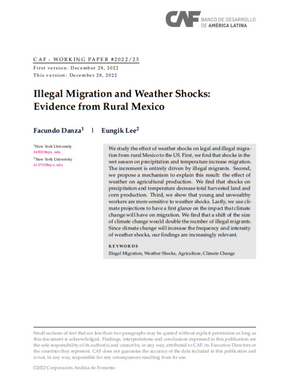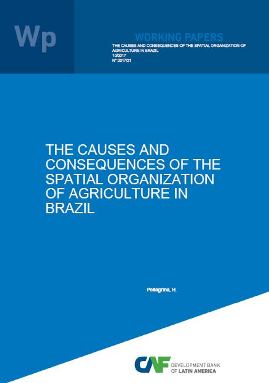The Origins of Structural Transformation
| dc.contributor.author | Caunedo, Julieta | |
| dc.contributor.author | Felix, Mayara | |
| dc.contributor.author | Manysheva, Kristina | |
| dc.coverage.spatial | Brasil | es_ES |
| dc.coverage.spatial | América Latina y el Caribe | |
| dc.date.accessioned | 2025-08-29T22:03:16Z | |
| dc.date.available | 2025-08-29T22:03:16Z | |
| dc.date.issued | 2025-08-29 | |
| dc.identifier.citation | Caunedo, J., Felix, M., & Manysheva, K. (2025, August 29). The Origins of Structural Transformation. Retrieved from https://scioteca.caf.com/handle/123456789/2516 | en_GB |
| dc.identifier.uri | https://scioteca.caf.com/handle/123456789/2516 | |
| dc.description.tableofcontents | The study examines how labor market shocks originating in non-agriculture affect the organization of agricultural production. Using data from Brazil between 1986 and 2017, it shows that the entry of large non-agricultural firms leads to persistent increases in local wages, declines in agricultural employment, and a shift toward more capital-intensive farming. Farms consolidate, the number of small operations declines, and mechanization increases. To study the magnitude of this reorganization, we develop a general equilibrium model which predicts that a reduction in entry costs in non-agriculture leads to labor reallocation out of agriculture, farm exit, and capital deepening. When we hold mechanization fixed, these adjustments are substantially attenuated, highlighting the role of endogenous technology adoption as an important amplification mechanism. | es_ES |
| dc.language.iso | en | es_ES |
| dc.subject | Agricultura | es_ES |
| dc.subject | Economía | |
| dc.title | The Origins of Structural Transformation | es_ES |
| dc.type | workingPaper | es_ES |
Arquivos deste item
Este item aparece na(s) seguinte(s) coleção(s)
-
6.1 Documentos de trabajo en investigación socioeconómica
En esta colección se encuentran los documentos de trabajo sobre temas económicos y sociales prioritarios para la región.




